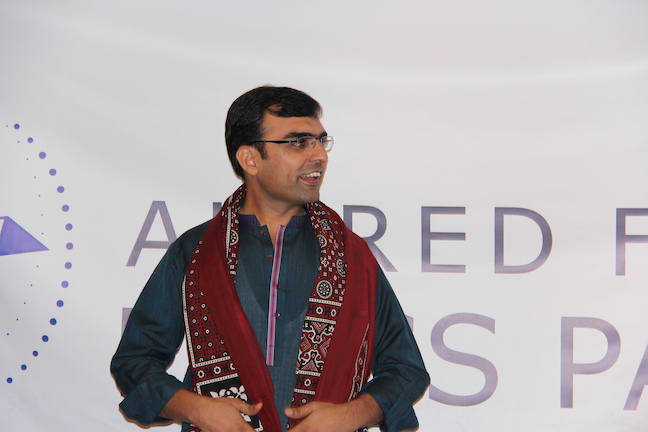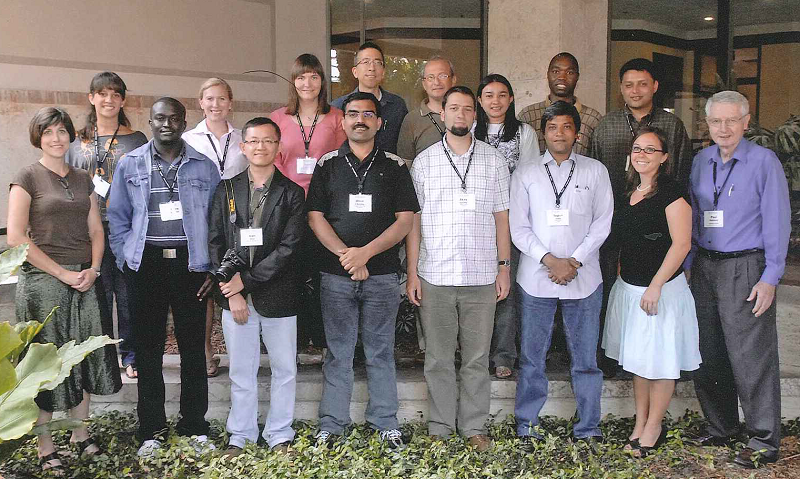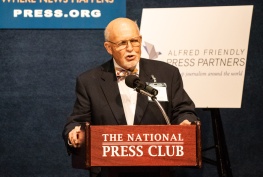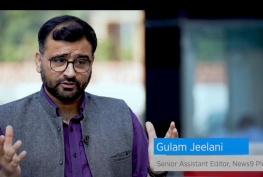
Umar Cheema (Class of 2008) was a co-trainer at an Alfred Friendly Press Partners investigative journalism training workshop
By Elise Schmelzer
Umar Cheema loves taxes. The Pakistani journalist sees paying them as a civic duty, and he’s devoted to making sure people in power are paying them, too. Cheema, a former Daniel Pearl Fellow, uses the tax codes to hold the leaders of his country to the same rules that govern the citizens they represent.
One investigation by Cheema revealed that more than 70 percent of Pakistan’s parliament did not pay income taxes in 2011. The report, published by news outlets around the world, caused an international uproar and led to major reforms in Pakistan’s tax law.
That story prompted the government to publish a list of lawmakers who had paid taxes and how much they had paid, allowing the public to hold them accountable.
“I have done many stories, but no other story has had such a lasting impact,” Cheema said. “I don’t think a lot of journalists understand the power they possess. They must realize it and use it for the good of society.”
Since then, Cheema has helped journalists in the Middle East and Europe report on the tax codes in their own countries and continues to report on taxes and other topics for The News, the English-language daily where he has worked since 2007.
The report was the first major project published by The Center for Investigative Reporting in Pakistan, a nonprofit founded by Cheema in 2012.
The nonprofit supports Pakistani investigative journalists who too often face threats and violence for their work. The center provides training for journalists, helps them network and offers mentoring for students.
Cheema’s dedication to holding institutions accountable and his drive to create the center comes from the six months he spent working at The New York Times as a Daniel Pearl Fellow in 2008, he said.
“The urge to set up the center was driven by the fellowship because I realized I had learned many things that are not being practiced and that were not being taught to other people,” he said. “This is the way I’m trying to make a difference.”
The experience challenged him to try new things and to double check that every fact is completely accurate. He learned to write more concisely and to leave opinion out of news stories. More than anything, he learned to try new reporting strategies and writing techniques.
“Intellectually I’m very liberal, but culturally I’m very conservative,” Cheema said. “I had to take a look at my old habits and had to adopt new things.”
He worked on the city desk in New York, where he wrote about a variety of topics including the court system, transportation and calorie counts. As a Washington D.C. reporter, Cheema met with high-level government officials and attended briefings in the nation’s capitol.
“Even today when someone asks me about the fellowship I tell them that the fellowship was one of the most rewarding experiences of my life,” he said. “I felt honored being there at The New York Times.”
One of the most poignant memories Cheema has from his time with the program was meeting the parents of Daniel Pearl, the American-Israeli journalist who was killed while reporting in Pakistan in 2002. Pearl is the namesake of the Daniel Pearl Foundation, which underwrote Cheema’s fellowship administered by Alfred Friendly Press Partners.
Cheema would later endure violence for his own reporting in Pakistan. In 2010, he was kidnapped, stripped naked and tortured. His attackers shaved off his hair and eyebrows. They videotaped him in humiliating positions. He thought of his two-year-old son.
Before they released him, Cheema’s attackers told him to stop writing articles critical of the government and to never speak of what had happened. He didn’t listen.
“I had to put up a brave face as if I didn’t know the word ‘fear,’” he said. “I had to send a strong message that I’m not a coward and that I can’t be intimidated.”
Instead of living silenced, Cheema spoke to multiple news outlets about the attack, including The New York Times. He continued to investigate the government for The News, the English-language daily where he has worked since 2007. He’s also written about national politicians who don’t show up to work, the dangers of building a city in an area prone to earthquakes and politicians using military-owned land as bribes.
Cheema has won numerous awards for his work, including the Committee to Protect Journalists International Press Freedom Award, the Knight International Journalism Award, the Tully Center Free Speech Award and a Missouri Honor Medal.
Cheema is not the only Pakistani journalist to suffer for investigating the government. Since 1992, 32 journalists have been killed in Pakistan for their work, according to the Committee to Protect Journalists. Hundreds more endure physical attacks and threats for doing their jobs. Few speak up for fear of more retribution, Cheema said, but he felt it was his duty despite the threat.
“We should fight the fear,” he said. “If we cannot fight the fear, we cannot fight the enemy. Fear is the biggest enemy.”




